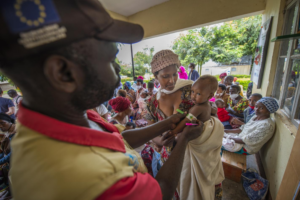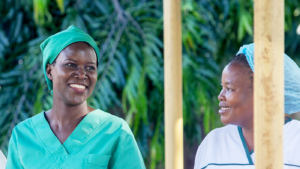
Uganda’s position as Africa’s largest refugee host is putting unprecedented pressure on its healthcare system as thousands flee from neighboring conflicts in Democratic Republic of the Congo (DRC), Sudan, and South Sudan. Many make dangerous journeys simply to access basic medical supplies unavailable in their home countries.
The story of 23-year-old Mvita Ngolo exemplifies this crisis. Five months pregnant, she trekked 25 kilometers through jungle terrain with her two toddlers from the DRC to Uganda, seeking basic medication including paracetamol (acetaminophen). The journey, undertaken mostly at night, brought her to a medical mission run by Emoter in Uganda’s Nebbi district.

Founded by three medical students, Emoter (Essential Medical Outreach and Treatment Rescue) operates primarily in Uganda’s West Nile region, focusing on the Nebbi district, where over 350,000 residents are served by just two hospitals. Now led by Dr. Lenka Karahutova, this predominantly female team of Czech and Ugandan healthcare professionals works to provide basic healthcare access in rural areas where it would otherwise be unavailable.
Uganda’s generous refugee and medical aid policies have made it a beacon of hope in the region, but with nearly two million recognized refugees, the system faces mounting challenges. The country has fewer than 10 surgeons nationwide and must now contend with additional pressures, including the threat of a new mpox variant spreading from the DRC.
Local and international NGOs are working to fill the gaps. Organizations like Emoter conduct regular medical outreach programs serving approximately 1,000 people daily, while Emergency, an Italian NGO, operates the country’s only pediatric hospital in Entebbe.
Emergency was founded in 1994 by Italian war surgeon Gino Strada. While primarily serving Ugandan children, about 10% of their patients come from nearby conflict zones, with the organization partnering with groups like Africa Humanitarian Action to identify urgent cases in refugee camps. Beyond providing immediate care, Emergency focuses on creating a sustainable healthcare model by training local medical professionals.
“Our goal is not just to care for patients, but to train local talent so that the country no longer has to rely on Western assistance and personnel when a crisis – like higher refugee arrivals or a new pandemic – arises,” their medical coordinator Luisa Napolitano told The Telegraph in October 2024.
“Even if my feet are sore, I’m grateful I could get enough to stock it and not go back to my friends empty-handed,” Ngolo told The Telegraph in October 2024, speaking about her journey to access basic medical supplies.
Read the full article by Stefania D’Ignoti from October 9, 2024 in The Telegraph: ‘I trekked pregnant through the jungle to get paracetamol’
Listen to this BBC Sounds podcast from October 17, 2024 about Emergency’s work in Uganda: The Children’s Hospital of Entebbe
Related Articles

“It is a risk someone has to take”: the Catholic Nun Helping Vaccinate Thousands in Uganda’s Karamoja
Karamoja has faced intracommunal violence for decades, and as climate change exacerbates water scarcity, it’s getting worse. But vaccinator Sister Virginia Virgo is not backing down.

A Welcoming Haven for Those Fleeing Strife and Insecurity: Uganda’s Unique Refugee Policy
Uganda’s refugee policy presents a unique example to the world: refugees are welcomed to the country, they are given land and are provided with basic services. They enjoy freedom of movement – although they do not receive Ugandan citizenship.

Sightsavers from the Field: “Everyone Deserves Quality Eye Care Services”
In Uganda, an inclusive eye health programme has helped to protect people’s vision and build a sustainable eye care system for everyone.
